Preparing Youth for Civic & Politics in the Digital Age Transcript
Speaker 1: The internet and digital media are now central to the way in which young people participate. It's where young people get their information and news. It's often where they can express their own perspectives about civic or political issues.
Speaker 2: Right now, at this time, I'm gonna need you treat each other as equals.
Speaker 3: Morning, everybody. Alright, one of the questions that you guys-
Speaker 4: Digital media, yes. It's something that they're entrenched in. But an educator has to purposefully teach them how to use it.
Speaker 5: While young people know how to tweet and text, not all youth know how to do so in an impactful and an informed way, especially towards civic and political ends.
Speaker 6: 'Cause we're not just talking about likes here, we're talking about people thinking about how your perspective is different than my perspective. And how maybe we have something in common that I didn't get before. Let's think about what is the takeaway. What point is Charlie trying to make? 'Cause ...
Speaker 1: We see from our research that there has been a sizeable increase in young people's engagement in civic and political life online. And we call these changes participatory politics. What this means is that young people are getting opportunities to create and share media, to enter into dialogues. Often not structured by elites or formal institutions, they can do this on their own terms and in their own ways.
Speaker 5: Unfortunately, we find from the research that these opportunities are not equitably distributed so on average, white students, middle class students, and students in higher track classes are provided these kinds of opportunities, but they are not provided to all young people across the board.
Speaker 7: If I were white, would I have to worry about if I'm gonna make it home that night? If a cop's gonna approach me?
Speaker 6: I think young people can put information out into the world, but they don't always have an editor to help them think about appointed strategy for what reaction and what actions they want to get in return for their media. So a couple things I see, length-wise, we're much more in the arm-line up end territory, which is fi-
Commentaries are a natural first product to get your feet wet because you're saying, "Let's start with something that you know, your story. And let's build from there about why other people might care about your story". That's the argument you want them to take away from what you're saying.
Speaker 8: Obviously it's really fulfilling, and it makes me feel more powerful. My voice matters.
Speaker 9: We're seeing young people use digital and social media in all sorts of interesting ways to express their civic voice and agency. So for example, they're investigating issues that matter to them and circumstances that they encounter in their lives using research to do so. They are producing and spreading content, whether it's their own original stories, or if they're curating and then boosting content that they see from their peers or other news sources. And finally in some cases, we're seeing young people mobilize their communities behind specific actions or activities that matter to them.
Speaker 3: If you guys have already done your tweet, feel free to go ahead and retweet, quote tweet, whatever you want.
Speaker 6: Literacy and language is not just spoken or heard. Knowing how to create a meme or knowing how to create a video, or an infographic. It's necessary to be as fluent in those languages as it is writing or speaking.
Speaker 9: Three challenges come to mind for youth in the digital age. Number one is something that we talk about as digital afterlife, so when they make choices today as young people for what they want to share about themselves, how do educators and others work with young people to imagine what the consequences for that might be later on in their own trajectories, both professional and personal. Number two is really a tension that we're seeing between free speech and hate speech. It's also something that's being worked out moment-to-moment in social media in terms of the kind of speech that young people encounter, and how they exercise their right to free speech in such a way that they can be heard. And then finally, there is this question of credibility. How do young people determine the credibility of the information that they encounter?
Speaker 5: There are a few things that educators can do. They can provide young people with opportunities to analyze and evaluate online information and judge the credibility of that information. They can provide opportunities for young people to dialogue about pressing and controversial issues, on and offline. They can help young people learn to produce compelling and impactful media, and circulate that media, and also understand the strategies and tactics for addressing an issue or responding to an issue to create change.
Speaker 6: It is harder and harder these days to have a conversation with someone you disagree with. And this is really a tool, not just to speak to your own circles, but to speak to people who don't know you and get them to come away with context that mimic a change in the world that you share.
Speaker 1: There's a lot of evidence now from our research that the distribution of activities by young people, civically and politically online is quite equitable across different groups. So if we want young people to be involved in society and in making the world a better place, and if we want all groups of young people to be involved, digital engagement creates a great opportunity.


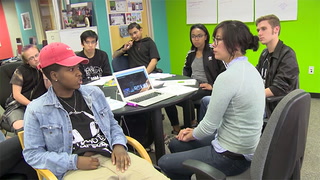
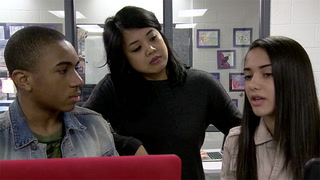
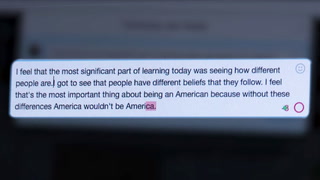
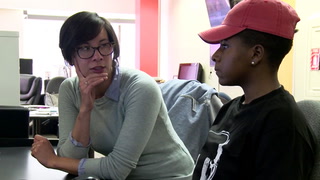
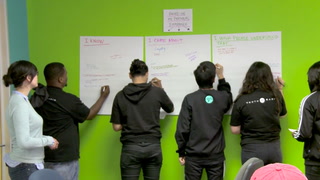









5 Comments
Cade Patterson Aug 23, 2019 1:58pm
This is very important for teachers to address politics and digital literacy in the classroom. As we know technology has taken over everyone’s lives through work, social media, and communication. There is a lot of things these students need to learn when it comes to social media. What they say or post on any of the social media sights, blogs, or webpages can be seen by everyone. That includes future employers and organizations. This is a great video and is very important for students to learn the importance of being smart on the web.
Adriana Soza Nov 15, 2018 11:19pm
This video is awesome! I think one of the greatest tools that educators could have is being able to relate to young people and those that they are educating. it is important for educators to understand the impact of the internet, technology, and social media today. A lot of adults, in my opinion, do not feel that the ideas of the youth are important, and they invalidate their feelings. Many see political ideas on social media made by young adults or "millennials" to be invalid, and I find it amazing that these teachers are showing that the ideas of the youth are very much important, and what they say online can create a change. These teachers are giving students voices, and guiding them to make good decisions on the internet and on social media platforms. I think this is a great skill that should be taught to the youth, instead of just "shutting them up."
TRACEY KOUBA Oct 17, 2018 5:13pm
The video briefly touches on the point of teaching appropriate usage of digital media. I believe there are several challenges students face using the Internet, social media or even online gaming platforms. The first is Internet safety. As my own children use snapchat, instagram, or even Xbox, there is always a concern of who can gain inappropriate access to them. It is extremely important to make students aware of the dangers that lurk out in the digital world and ways to protect themselves. Second is teaching proper social ettiquette. Children, as we know, lack certain decision-making skills, impulse control or even control over their emotions. It is important to teach students empathy and respect when corresponding on digital media. Finally, writing skills. We want students to be able to get the message they want to convey into the world without any misunderstanding. Correct grammar, punctuation, and proper word usage is an integral part of effective communication.
Daniel Moore Aug 15, 2018 10:58am
Randel Louie Adao Apr 26, 2018 7:48pm